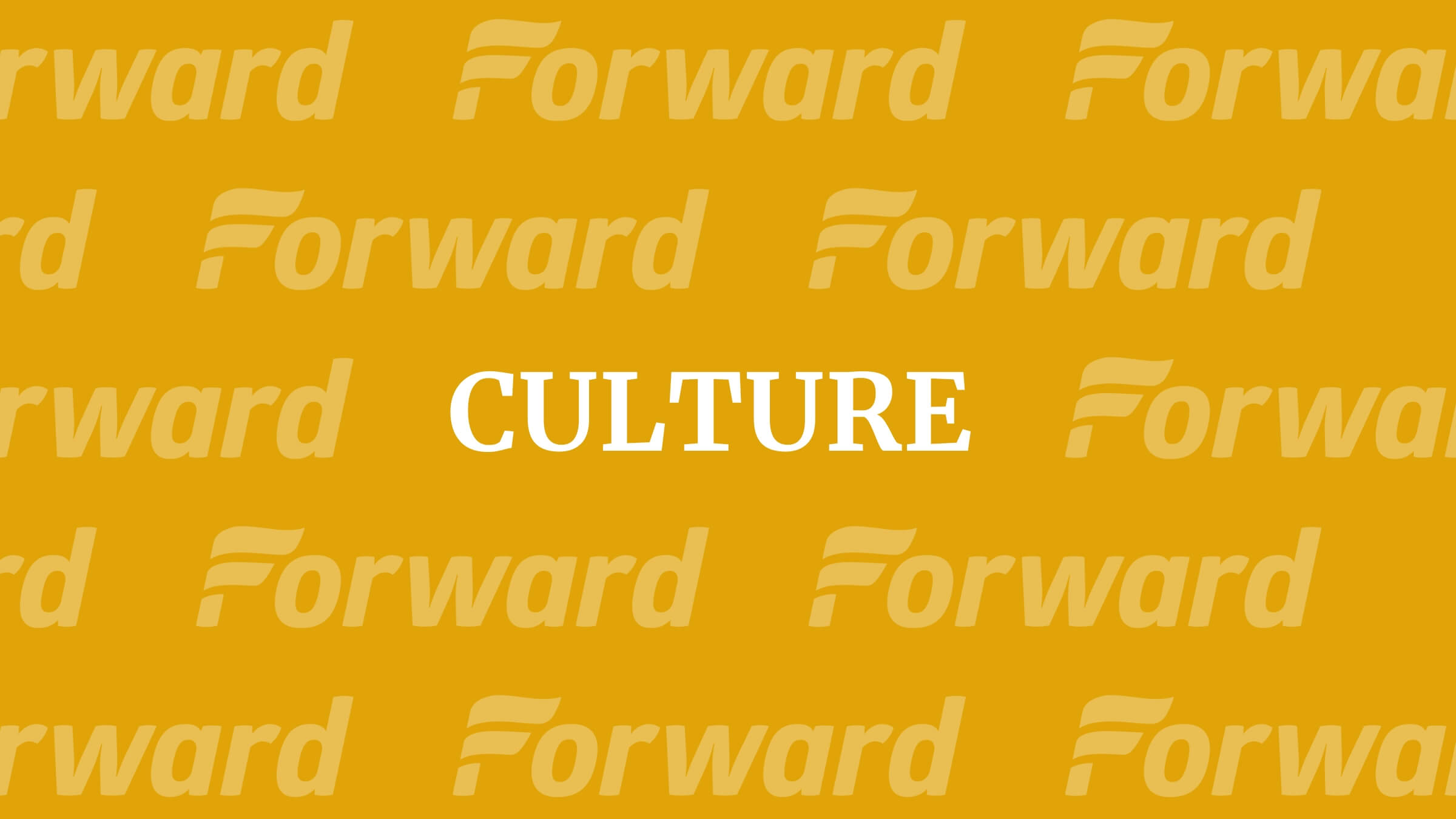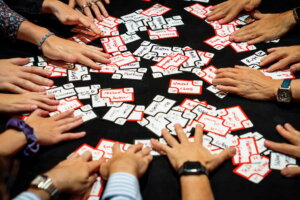One of our great magicians thinks he knows why there are so many Jews in his field
Asi Wind follows in the tradition of Harry Houdini, David Copperfield and David Blaine

Graphic by Angelie Zaslavsky
“Magic is a vehicle,” Asi Wind says. “It’s a bit of a shortcut to get close to people, to crack open this shell of protection I think everybody has. Keep you at a bit of a distance. Once you do the magic, they kind of open up. They’re OK being vulnerable.”
These days, the Israeli-born Wind is considered one of the finest close-up, playing-card magicians in the world. And he is cracking that shell eight times a week with Asi Wind’s Inner Circle, at the Judson Theatre, in the basement of Judson Memorial Church in Greenwich Village. The New York Times has called him “a master at the top of his game.”
Wind, 44, grew up in Holon, near Tel Aviv, as Asi Betesh, a descendant of Jews from Syria (on his father’s side) and Iraq (on his mother’s).
“I found magic almost by luck,” he told me over Zoom from his Manhattan home. “My uncle used to show me some tricks. Never taught me. Never showed me how it’s done. He had a book, and I was dying to see that book. But it was on a very high shelf. I couldn’t get to it. So I put a chair on top of a table and I climbed up. And I took the book and I started reading it. This was a very soft introduction to magic. It didn’t make me want to become a magician. But it was my first introduction.
“The second one was, I went to a magic shop in Tel Aviv. And the guy did some tricks for somebody else, and I was like, this is crazy. And I was next in line and I said OK, show me something. And he showed me this trick. And at the end, I’m like, he’s telling me that 50 shekels is what’s keeping me away from knowing how it’s done. Really? So I bought the trick.”
As a youth, he said, he was “very timid and shy. And I remember going to school and starting to show the tricks that I got at the magic shop. And all of a sudden people noticed me. People started to pay attention to me.”
“Later,” he said, “I begged my father — they were doing magic courses at that store. I said I wanted to do this course. And I did it. And I started to be a birthday party magician.”
He has said he changed his surname because he was ashamed of it.

“It’s a very unfortunate subject,” he said. “You have to understand the history of Israel. Israel was first occupied and built by Ashkenazi Jews, European Jews. Maybe there were some Sephardic Jews in Israel, but the first Aliyah, the first immigration, basically started coming from Europe. It was really dominated by Europeans, all Ashkenazi. And after the Holocaust, it was even more so. So all the foundation was set by European culture.
“At some point, the government understood it’s a numbers game. We need more Jewish people to occupy the land, to make a Jewish country. And they said, ‘let’s get all the Jews from the Arab countries.’”
Wind said he thinks it was Moshe Sharett, Israel’s first foreign minister, and prime minister in the mid-1950’s, “who said yes, we want quantity but not at the expense of quality — or something to that effect. As a kid, I always wondered, how could it be this happened to us. People that were killed because they were Jewish now basically cast hatred toward Arab Jews. The first big conflict that lived within Israel were Sephardic Jews and Ashkenazi Jews.”Sephardim “were really, really considered Class B and C and were looked down to,” Wind told me.
By the time he was growing up, he said, things had improved. “It was not even close to what I was describing to you as the beginning of this conflict or problem,” he said. “But in a weird way it was still there to some degree, and I was a little more sensitive to it than, let’s say, my friends.”
“In a weird way,” he said, “I thought being Ashkenazi was more cultured and more sophisticated.”
“I say now that I changed my name so people would treat me better, but I realized I had to learn how to treat myself better. That was a big realization.”
The name “Wind,” he said, just appealed to me. “There was a guy on a newspaper for teenagers,” he said. “His name is Noam Wind. A photographer. And I just liked it. I don’t have a very cool reason. I talk a lot. So I make a lot of wind. Maybe that’s the reason.”
The magician Joshua Jay recently wrote about why so many magicians are Jewish, so many more percentage-wise than the Jewish percentage of the world’s population. The legendary Harry Houdini, Jay noted, was the son of a rabbi. And then there’s David Copperfield (David Seth Kotkin), and David Blaine, and David Roth, and Max Maven. And Ricky Jay. And Raymond Joseph Teller, of Penn and Teller. And Joshua Jay himself.
“Jewish families have, historically, put an emphasis on learning and hard work,” Jay wrote, citing a reason for Jewish preeminence in the world of magic, “and these are the two sterling qualities that magicians require to achieve mastery.”
Wind agreed. “If you ask many people, they will give you different answers,” he said, “but I was really fascinated by this phenomenon. A great magician, Max Maven, had an hour-and-a-half lecture on that.”
“Jews really celebrate knowledge,” Wind told me. “It’s of real importance. We’re people of the book. When we say knowledge is power, oh, we practice that. I think it starts with religion. It starts with the Talmud. The Jewish people study books.”
It’s “every word, and what does it mean, and what’s the interpretation of it. In Yeshivas Jews sit down and argue all day about the meaning of this book. Our obsession with knowledge. And you talk about secret knowledge. We’re not just studying a book. We’re studying something that has a magical power. Or a mystery to it. We’re obsessed with secret knowledge,” Wind told me. “We understand that knowledge and especially secret knowledge is a superpower. And something about us being in a constant fight for a home — I think we still are fighting for a home — makes us think that we need to have a superpower. In order to exist we need to still be strong, we need to still be sharp, we still need to be on top of it. We are constantly in survival mode.”
Wind moved to New York in his early 20s, did magic tricks for tips in Washington Square Park, and worked at Toys R Us and at children’s parties until he slowly began to get gigs. For a decade, he was chief consultant to Blaine, who is presenting Inner Circle.
At the Judson, trim and fit, relaxed and personable, attired in black T-shirt, black jeans and black sports jacket, his dark hair sprinkled with gray, Wind spends 75 minutes delighting and amazing his audience, which remains rapt throughout and often gasps at his legerdemain.
The theater has been reconfigured and redesigned for 100 seats, mostly in a semicircle with several audience members seated just below center stage at a round table on which Wind places the playing cards he will use in his performance.
These are not regular playing cards. No jacks, kings, queens, aces or numbers. Before the show, each audience member is given a blank card with a blue back — half with a red front, half black, on which to write their first and last names. These will be the props for the evening.
Where did he get the idea for the very personalized playing cards?
“There’s a place in Hollywood called the Magic Castle,” he told me. “Two weeks before the show, a friend asked me, what are you going to do? And I said, ‘I don’t know. I’ll take a pack of playing cards and do some card tricks.’ And he said, ‘you can do better than that.’ And I looked at my notes — I have a lot of notes that I take — and one of the notes said, ‘why don’t you do a show with a pack of playing cards that’s blank and the audience creates it before the show?’
“That’s all I had. And he said that’s really cool and I went home and put together five or six tricks — a short set, 20 minutes, went to the Castle, and did this act. And the response to it was overwhelming. Above and beyond what I expected it to be. People waited three hours in line to see it. It surprised me. I thought it was a good idea. I didn’t realize it was that good.”
“The moment you’re dealing with people’s names, it really changes the texture and the meaning of every trick I do,” he said. I’m not dealing with the identities of playing cards. I’m dealing with the identities of the audience. It’s an immediate connection. It could evoke something that’s much more than the two of clubs.”
“It’s about the audience. It always was for me. And this drove it home. The magic show helps me connect to the audience. To create some sort of bond that with magic I think is possible to do. Not easy, but possible. This idea makes it even more so.”
And what about his future? What’s next for this magic magician? What does he have up his sleeve?
“I’ve been studying Buddhism,” he said — “the philosophy, not the religion. I’m still obsessing over the present. And I’m enjoying this too much. Yes, of course, there’s always a place for the future. But it’s in the background. It’s not as important to me as living day by day, enjoying this show. Enjoying what I do now.”
















